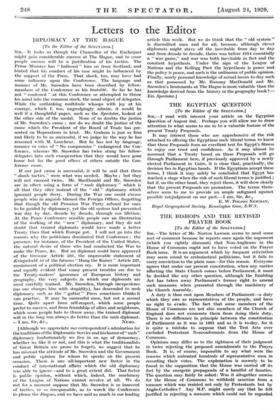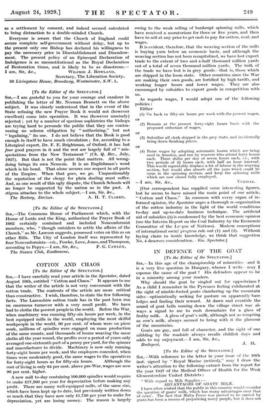THE BISHOPS AND THE REVISED PRAYER BOOK
[To the Editor of the SPECTATOR.]
SIR,—The letter of Mr. Norton Lawson seems to need some sort of comment because he repeats once again the argument (which you rightly discount) that Non-Anglicans in the House of Commons ought not to have voted on the Prayer Book issue. It is an argument which by frequent reiteration may seem sound to ecclesiastical politicians, but it fails to carry conviction to the plain man—for this reason. Everyone agrees that under our present constitution, when any matter affecting the State Church comes before Parliament, it must be decided like any other question, although the Enabling Act has taken away Parliament's former right to amend such measures when presented through the machinery of the Church Assembly.
A duty is thus cast upon Members of Parliament—a duty which they owe as representatives of the people, and have no right to evade. The fact that some members of the House of Commons are not also members of the Church of England does not exonerate them from doing their duty. There is no difference in principle between the constitution of Parliament as it was in 1661 and as it is to-day, for it is quite a mistake to suppose that the Test Acts ever excluded Protestant Nonconformists from the House of Commons.
Opinions may differ as to the rightness of their judgment in twice rejecting the proposed amendments to the Prayer Book. It is, of course, impossible to say what were the reasons which animated hundreds of representative men in recording their votes. The explanation is scarcely to be found in the supposition that the House was carried off its feet by the energetic propaganda of a handful of fanatics. The question may fairly be asked:. Was it altogether unwise for the House of Commons to withhold sanction from a measure which was resisted not only by Protestants but by Anglo-Catholics ? Any M.P. might surely say that he felt justified in rejecting a measure which could not be regarded
as a settlement by consent, and indeed seemed calculated to bring distraction to a double-minded Church.
Everyone is aware that the Church of England could secure complete self-government without delay, but up to the present only one Bishop has declared his willingness to pay the necessary price in Disestablishment and Disendow- ment. The present policy of an Episcopal Declaration of Indulgence is as unconstitutional as the Royal Declaration of Restoration times, and is likely to be as disastrous.— Secretary, The Liberation Society. 39 Livingstone House, Broadway, Westminster, S.W.1.































 Previous page
Previous page